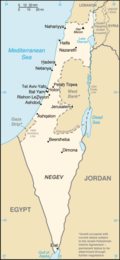The promised land
 Acting Israeli Prime Minister Ehud Olmert conceded recently that Israel would have to give up parts of the West Bank in order to preserve a Jewish majority within its borders. Specifically, he mentioned "giving up parts of the land of Israel," as if all Palestine belonged to Israel.
Acting Israeli Prime Minister Ehud Olmert conceded recently that Israel would have to give up parts of the West Bank in order to preserve a Jewish majority within its borders. Specifically, he mentioned "giving up parts of the land of Israel," as if all Palestine belonged to Israel.An article in the Globe and Mail by Israel Harel, "The Real Reasons for Hamas's Success," reinforced Olmert's view. Mr. Harel referred to Israelis giving up parts of their "historic homeland," as if Palestine was theirs to give.
This Israeli conceit leads to the discriminatory concept of a Jewish "Right of Return" which offers Jews everywhere citizenship in Israel. The idea that some old Palestinian woman living in a refugee camp in Lebanon, who holds the key in her hand to the house she was born and raised in, that her mother was born and raised in, and her grandmother before that, has less right to that house than some young Jewish man from New York, whose ancestors haven't set foot in Palestine for 2,000 years, is a travesty of both logic and decency.
Palestine has been a homeland for many peoples, from ancient Canaanites to modern Arabs and Jews. Israel is a modern nation created by Europeans, as colonial a project as stealing North America from the Indians, and it has no right to an inch of land beyond the borders granted by the United Nations.







